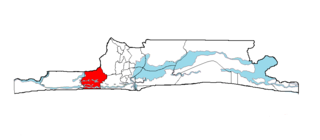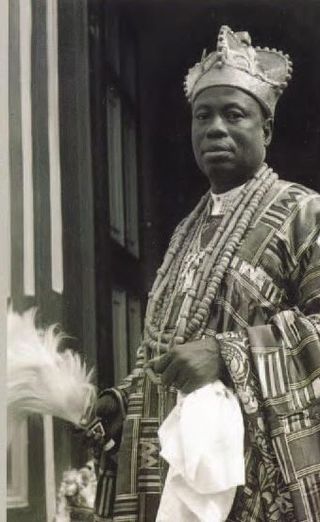Related Research Articles

Lagos State is a state in southwestern Nigeria. Of the 36 Nigerian states, it is the second most populous state but the smallest in area. Bounded to the south by the Bight of Benin and to the west by the international border with Benin for 10 km, Lagos State borders Ogun State to the north for about 283 km, making it the only Nigerian state to border only one other state. Named for the city of Lagos—the most populous city in Africa—the state was formed from the Western Region and the former Federal Capital Territory on 27 May 1967.

Lagos State University, popularly known as LASU, is a Lagos state government-owned university established in 1983. Its main campus is situated at Ojo, with sub-campuses at Ikeja and Epe. The university was set up "for the advancement of learning and establishment of academic excellence". The university caters to over 35,000 students. The university was established during the administration of Late Lateef Kayode Jakande. The university offers diploma, degree and post graduate programmes, including an MBA programme. LASU was ranked among the top 600 universities in the world by the Times Higher Education World University Rankings for 2020. On 23 June 2021, LASU emerged as the best young university in Nigeria having been below the age of 50 years to be added. Times Higher Education ranked the Lagos State University as the second best university in Nigeria on 2 September 2020, and was the only state university included in the rankings for 2022. The university has attracted international funding, including for the establishment of a World Bank Group Africa Centre for Excellence on Science, Technology, Engineering, and Mathematics.

Henry Townsend (1815–1886) was an Anglican missionary in Nigeria.

Joseph Ayo Babalola was a Nigerian Christian minister and the leader of the Christ Apostolic Church, popularly called CAC in Nigeria. He was a healing evangelist.

Badagry Division is an administrative division of Lagos State in Nigeria.

The Awori is a subgroup of the Yoruba people speaking a dialect of the Yoruba language. The Awori people are the original inhabitants of Lagos State and some parts of Ogun State, namely Ado-Odo/Ota Local Government Area of Ogun State. The Awori people are landowners, farmers and fishermen.
Sarah Adebisi Sosan is a Nigerian politician and former teacher, she served as deputy governor of Lagos State from 2007 to 2011.

Toyin Omoyeni Falola is a Nigerian historian and professor of African Studies. Falola is a Fellow of the Historical Society of Nigeria and of the Nigerian Academy of Letters, and has served as the president of the African Studies Association. He is currently the Jacob and Frances Sanger Mossiker Chair in the Humanities at the University of Texas at Austin.
Ado-Odo is the metropolitan headquarters of the ancient kingdom of Ado, renowned for its Oduduwa/Obatala temple, the ancient fortress of the traditional practice of Ifá. Oodu'a is also regarded by traditionalists as the mother of all other deities. All of these made Ado an inviolate territory in western Yorubaland—the same "father-figure" status accorded to Ile-Ife. Unlike the other kingdoms, which had at one time or the other engaged in the internecine wars that ravaged Yorubaland in the nineteenth century, Ado stood out as an unconquered sanctuary city-state throughout the period.

Badagry, also spelled Badagri, is a coastal town and Local Government Area (LGA) in Lagos State, Nigeria. It is quite close to the city of Lagos, and located on the north bank of Porto Novo Creek, an inland waterway that connects Lagos to the Beninese capital of Porto-Novo. The same route connects Lagos, Ilaro, and Porto-Novo, and shares a border with the Republic of Benin. As of the preliminary 2006 census results, the municipality had a population of 241,093.

Lagos Colony was a British colonial possession centred on the port of Lagos in what is now southern Nigeria. Lagos was annexed on 6 August 1861 under the threat of force by Commander Beddingfield of HMS Prometheus who was accompanied by the Acting British Consul, William McCoskry. Oba Dosunmu of Lagos resisted the cession for 11 days while facing the threat of violence on Lagos and its people, but capitulated and signed the Lagos Treaty of Cession. Lagos was declared a colony on 5 March 1862. By 1872, Lagos was a cosmopolitan trading centre with a population over 60,000. In the aftermath of prolonged wars between the mainland Yoruba states, the colony established a protectorate over most of Yorubaland between 1890 and 1897. The protectorate was incorporated into the new Southern Nigeria Protectorate in February 1906, and Lagos became the capital of the Protectorate of Nigeria in January 1914. Since then, Lagos has grown to become the largest city in West Africa, with an estimated metropolitan population of over 9,000,000 as of 2011.

Ojo is a town and local government area in Lagos State, Nigeria, with a few notable locations such as Lagos State University and the Alaba International Market as well as others. Ojo is located on the eastern section of the Trans–West African Coastal Highway, about 37 km west of Lagos. It is a part of the Lagos Metropolitan Area.
Omoba Yinka Mursiq Durosinmi is a Nigerian politician and former chairman of Ojo local government area of Lagos State.

Oba Sir Musendiku Buraimoh Adeniji Adele II, KBE was the Oba (King) of Lagos from 1 October 1949 to 12 July 1964.

The Agia Tree MonumentAgiya Tree Monument is on the site once occupied by the Agia Tree close to the Badagry Town Hall. The Agiya tree was a 160 feet (49 m) tree with a circumference of 30 feet (9.1 m). Significantly remarkable for being the tree under which Christianity was first preached in Nigeria by Thomas Birch Freeman and Henry Townsend on 24 September 1842, the tree lived for over 300 years until it was uprooted by a storm on 20 June 1959.
The Territories of the Awori are a part of Nigeria inhabited by the Awori tribe sub-ethnic group of the Yoruba people, speaking a distinct dialect of the Yoruba language. Traditionally, Awori are found in two Nigerian States: Ogun and Lagos.
Chief Joseph Folahan Odunjo (1904–1980) was a Nigerian writer, educator and politician best known for his works in Yoruba children's literature.
Mobolanle Ebunoluwa Sotunsa, also known as Bola Sotunsa is a Nigerian academic. She is a Professor of Gender Studies and African Oral Literatures in the Department of Languages and Literary Studies, Babcock University.https://www.babcock.edu.ng/faculty/Sotunsam
Àrìnpé Gbẹ́kẹ̀lólú Adéjùmọ̀ is professor of Yoruba Language and Literature at the University of Ibadan, Nigeria, and an author and playwright. She is known for her scholarship on Yoruba drama, satire, and gender studies.
References
- ↑ Sorensen-Gilmour, Caroline (1995). "Badagry 1784–1863: The Political and Commercial History of a Pre-Colonial Lagoonside Community in South West Nigeria," PhD. Thesis, University of Stirling.
- ↑ Falola, Toyin (2021-12-21). "Coastal Yorubaland: Habitability, Inhabitance, and Inheritances". Yoruba Studies Review. 2 (1). doi: 10.32473/ysr.v2i1.129842 . ISSN 2578-692X. S2CID 245717212.
- 1 2 3 Falola, Toyin (1999). Yoruba Gurus: Indigenous Production of Knowledge in Africa. Africa World Press. ISBN 978-0-86543-699-2.
- 1 2 3 4 Falola, Toyin; Avoseh, Theophilus Olabode (1992). "The Minor Works of T. O. Avoseh". History in Africa. 19: 237–262. doi:10.2307/3172000. ISSN 0361-5413. JSTOR 3172000. S2CID 161356301.
- 1 2 3 Falola, Toyin (1995). "T. O. Avoseh on the History of Epe and Its Environs". History in Africa. 22: 165–195. doi:10.2307/3171913. JSTOR 3171913. S2CID 162279990.
- ↑ Asiwaju, A. I. (1979). "The Aja-speaking Peoples of Nigeria: A Note on their Origins, Settlement and Cultural Adaptation up to 1945". Africa. 49 (1): 15–28. doi:10.2307/1159502. ISSN 0001-9720. JSTOR 1159502. S2CID 145468899.
- ↑ Asiwaju, A. I. (1984). "The Aja-Speaking Peoples in Nigeria: A Note on their Origins, Settlement and Cultural Adaptation up to 1945". In de Medeiros, François (ed.). Peuples du Golfe du Bénin: Aja-Éwé: Colloque de Cotonou (in French). KARTHALA Editions. ISBN 978-2-86537-092-4.
- ↑ Tijani, Hakeem I. (2007). "The Career of Akinpelu Ipossu in Lagos and Epe c. 1790-1879". In Akurang-Parry, Kwabena O.; Kolapo, Femi J. (eds.). African Agency and European Colonialism: Latitudes of Negotiation and Containment: Essays in Honor of A.S. Kanya-Forstner. University Press of America. ISBN 978-0-7618-3846-3. OCLC 768083474.